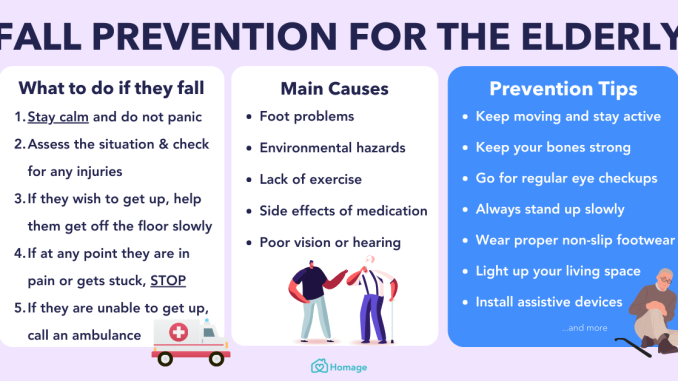
As we age, our bodies become more vulnerable to falls and injuries. According to the Centers for Disease Control and Prevention, falls are the leading cause of injury and death among older adults. However, with the right precautions and preventive measures, seniors can reduce their risk of falling and stay safe and healthy as they age. In this article, we will discuss some tips and strategies to help prevent falls and injuries in seniors.
Stay Active and Maintain Strength and Balance
One of the best ways to prevent falls in seniors is to stay active and maintain strength and balance. Regular exercise, such as walking, swimming, or tai chi, can help improve muscle strength, flexibility, and balance, making it easier to prevent falls. Seniors should aim to exercise for at least 30 minutes a day, several days a week, to maintain their physical fitness and reduce their risk of falling.
Wear Proper Footwear
Another important factor in preventing falls in seniors is wearing proper footwear. Seniors should wear shoes that provide good support and have non-slip soles to prevent slipping and tripping. Avoid wearing high heels, flip-flops, or shoes with slippery soles, as these can increase the risk of falling. It’s also a good idea to regularly check the condition of your shoes and replace them if they become worn or damaged.
Make Home Modifications
Making modifications to your home can also help prevent falls in seniors. Simple changes, such as installing grab bars in the bathroom, adding non-slip mats to the shower or bathtub, or removing clutter and tripping hazards from walkways, can make a big difference in reducing the risk of falling. Consider having handrails installed on staircases and ramps, and make sure that all areas of the home are well-lit to improve visibility and prevent falls.
Regularly Review Medications
Some medications can cause dizziness, drowsiness, or other side effects that may increase the risk of falling in seniors. It’s important to regularly review your medications with your healthcare provider and make sure you are taking them as directed. If you experience any side effects, talk to your doctor about alternative medications or dosage adjustments that may help reduce your risk of falling.
Get Regular Vision and Hearing Check-ups
Poor vision and hearing can increase the risk of falls in seniors, as they can affect balance, coordination, and spatial awareness. Seniors should get regular vision and hearing check-ups to ensure that their senses are functioning properly and to address any issues that may be affecting their ability to move safely. If you wear prescription glasses or hearing aids, make sure they are up-to-date and in good condition to help prevent falls.
Stay Hydrated and Eat a Healthy Diet
Staying hydrated and eating a healthy diet can also help prevent falls in seniors. Dehydration can cause dizziness and weakness, making it easier to lose balance and fall. Seniors should aim to drink at least 8-10 glasses of water a day and eat a balanced diet rich in fruits, vegetables, whole grains, and lean protein to maintain their overall health and reduce their risk of falling.
Conclusion
Preventing falls and injuries in seniors is crucial for maintaining their health, independence, and quality of life. By staying active, wearing proper footwear, making home modifications, reviewing medications, getting regular vision and hearing check-ups, and staying hydrated and eating a healthy diet, seniors can reduce their risk of falling and stay safe as they age. It’s important for seniors and their caregivers to work together to create a safe and supportive environment that helps prevent falls and injuries, allowing seniors to continue living independently and enjoying their golden years to the fullest.
